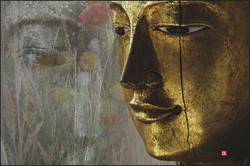“When the student is ready, the teacher will appear” ~ Buddha
So...
"What do Buddhists believe?"
I was taken aback by my own question. What do Buddhists believe? No one had told me I had to believe any particular thing. Indeed, in Zen Buddhism rigidly held beliefs are considered to be barriers to realization.
Guiding Means
Beginners to Buddhism are handed lists of doctrines -- the Four Noble Truths, the Five Skandhas, the Eightfold Path. One is told tounderstand the teachings and practice them. However, "believing in" doctrines about Buddhism is not the point of Buddhism.
What the historical Buddha taught was a method for understanding oneself and the world in a different way. The many lists of doctrines are not meant to be accepted on blind faith. The Venerable Thich Nhat Hanh, a Vietnamese Zen master, says "Do not be idolatrous about or bound to any doctrine, theory, or ideology, even Buddhist ones. Buddhist systems of thought are guiding means; they are not absolute truth."
The absolute truth of which Thich Nhat Hanh speaks cannot be contained in words and concepts. Thus, merely believing in words and concepts is not the Buddhist path. There is no point in believing in reincarnation/rebirth, for example. Rather, one practices Buddhism in order to realize a self not subject to birth and death.
Many Boats, One River
To say that doctrines and teachings shouldn't be accepted on blind faith doesn't mean they aren't important. The myriad teachings of Buddhism are like maps to follow on a spiritual journey, or a boat to carry you across a river. Daily meditation or chanting may seem pointless, but when practiced with sincerity they have a real impact on your life and outlook.
And to say that Buddhism is not about believing things doesn't mean there are no Buddhist beliefs. Over the centuries Buddhism has developed diverse schools with distinctive, and sometimes contradictory, doctrines. Often you might read that "Buddhists believe" such and such a thing, when in fact that doctrine belongs only to one school and not to all of Buddhism.
To compound confusion further, throughout Asia one can find a kind of folk Buddhism in which the Buddha and other iconic characters from Buddhist literature are believed to be divine beings who can hear prayers and grant wishes. Clearly, there are Buddhists with beliefs. Focusing on those beliefs will teach you little about Buddhism, however.
If you want to learn about Buddhism, (and I most certainly do) it is suggested that you put aside all assumptions. Put aside assumptions about Buddhism, and then assumptions about religion. Put aside assumptions about the nature of the self, of reality, of existence. Keep yourself open to new understanding. Whatever beliefs you hold, hold in an open hand and not a tight fist. Just practice, and see where it takes you.
And remember the Zen saying -- "The hand pointing to the moon is not the moon".

*Gautama Buddha, the founder of Buddhism, taught his followers not to believe in luck. The view which was taught by Gautama Buddha states that all things which happen must have a cause, either material or spiritual, and do not occur due to luck, chance or fate. The idea of moral causality, karma (Pali: kamma), is central in Buddhism. In the Sutta Nipata, the Buddha is recorded as having said the following about selling luck:

*Gautama Buddha, the founder of Buddhism, taught his followers not to believe in luck. The view which was taught by Gautama Buddha states that all things which happen must have a cause, either material or spiritual, and do not occur due to luck, chance or fate. The idea of moral causality, karma (Pali: kamma), is central in Buddhism. In the Sutta Nipata, the Buddha is recorded as having said the following about selling luck:
Whereas some religious men, while living of food provided by the faithful make their living by such low arts, such wrong means of livelihood as palmistry, divining by signs, interpreting dreams ... bringing good or bad luck ... invoking the goodness of luck ... picking the lucky site for a building, the monk Gautama refrains from such low arts, such wrong means of livelihood.
No comments:
Post a Comment